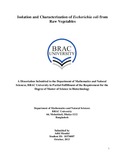| dc.description.abstract | Escherichia coli is a genetically heterogeneous group of bacteria whose members are typically nonpathogens that are a part of the normal microflora of the intestinal tract of humans and animal. However, some strains have acquired virulence factors that enable them to cause important intestinal and extra intestinal diseases such as diarrhea, hemorrhagic colitis (HC), hemolytic uremic syndrome (HUS), urinary tract infections (UTI), septicemia and neonatal meningitis. E. coli has been reported to be responsible for the outbreaks linked to consumption of fresh but raw vegetables and fruits (such as lettuce, spinach, carrots, radish sprouts, alfalfa, unpasteurized apple cider, melon and berries etc.). These vegetables get contaminated with pathogenic E. coli while growing in the field or on application of fertilizer (cow dung) or during harvesting, transport, processing, storage and distribution. In Bangladesh, neither sporadic illness nor outbreak associated with E. coli from fresh raw vegetables has been reported so far. For this purpose raw vegetables were collected around Dhaka city to isolate E. coli. The samples were first enriched in enrichment broth supplemented with bile salt and then plated onto MacConkey agar. A total of 65 isolates from 60 raw vegetable samples were presumptively selected as E. coli from primary MacConkey plate. The isolates were subjected to detailed biochemical characterizations using eosin methylene blue (EMB) agar medium, indole production test, methyl-red test, Voges-Proskauer test, citrate utilization test, triple sugar iron test and fermentation test. Out of 60 samples analyzed, only 30 isolates, 11 from Lettuce, 6 from chopped vegetables, 5 from Capsicum, 4 from sprout, 3 from Broccoli and 1 from street salad gave identical biochemical properties compared to a reference E. coli strain. Culturally and biochemically positive isolates were tested for stx1 and stx2 genes. From all these isolates, only stx1 gene was detected from eight isolates. Live cells of all stx1 gene positive isolates were found to show strong enterotoxic activity in the rabbit ileal loop assay. However, culture filtrates prepared from these isolates gave mild cytotoxic and neurotoxic activity. Alpha hemolysin activity was recorded from these isolates. Antibiotic sensitivity test was performed. All the isolates were found to be sensitive to cefoxitin, chloramphenical, gentamycin, naladixic acid, nitrofurantoin, norfloxacin and sulphamethoxazole/trimethoprim. To our knowledge, this is the first possible report of isolation of Shiga toxin producing E. coli from raw vegetables and its findings emphasize the need for vigorous washing with safe running water before consumption to prevent human infection. | en_US |

